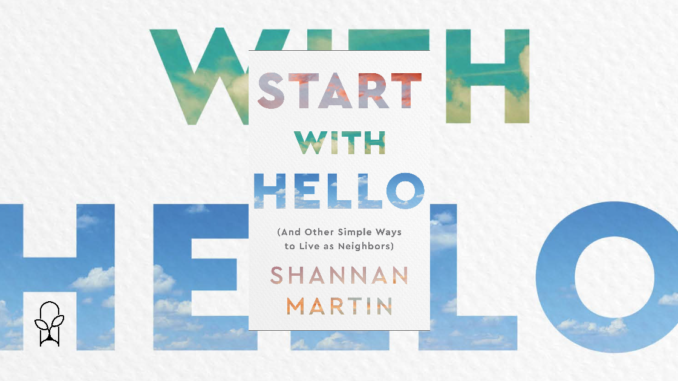
Published by Revell on October 11, 2022
Genres: Non-Fiction, Christian Life, Racial Reconciliation
Buy on Amazon
Goodreads

When was the last time you made a new friend? Chatted with a neighbor? Felt connected? This practical, compelling book shares simple practices for living as a more open-hearted, empathetic neighbor who sees past what divides us, looks for common ground, and is rewarded with vibrant and enduring friendships.
When popular bloggers write books, a common critique is that each chapter seems like a blog post. Shannan Martin avoids that common problem in Start with Hello, building on her theme in a sequential way instead of just telling cute stories. She explores multiple different issues related to hospitality and neighborliness, providing insightful encouragement to people who want to build relationships and open their home to people but don’t know where to start. Throughout the book, she deals with common personal hang-ups that people have about hospitality, and she also addresses common issues related to privilege, race, and money that can make it harder for people to achieve genuine community.
Great Elements
This book is highly readable and engaging, and Martin’s down-to-earth personal examples show how being neighborly can just mean waving and saying hello, even if a relationship doesn’t progress beyond there. She encourages readers to cultivate basic neighborliness along with a deeper sense of community, and because Martin is an introvert, her practical encouragement doesn’t require anyone to suddenly get a new personality. She shows how both quiet people and extroverted people can reach out to others, and outlines many of the practical steps that people can take to recover socially from the pandemic, get to know people in a new place, or start connecting with the people they’ve lived near for years.
For the most part, nothing in this book was new to me. I have already read hundreds of times, for example, that you don’t have to have a picture-perfect, totally clean home to invite people over. The stand-out aspect of this book isn’t that the advice is new, but that Martin shares so many meaningful personal stories to illustrate the points she makes about hospitality, community, and justice. I enjoyed her conversational writing style, her vulnerable personal disclosures, and her moving stories about her relationships with her neighbors, family, and friends. She also shares helpful insights about dealing with challenges like setting healthy boundaries in relationships when a friend is very needy, so that you can protect yourself from burn-out and give with joy.
Critiques
Although Martin’s writing is very engaging, I found some of her sentences so confusing that I had to read them repeatedly to understand them, and some of her metaphors never seemed to stick. I’m a very literal thinker, so it could be my problem, but she sometimes gave random analogies without unpacking the meaning, leaving them unfinished and moving on to something else. I felt that I was at a disadvantage by not knowing her blog, and sometimes wondered if she expected her readers to know her and her writing well enough to know what she was aiming for and fill in the blanks.
The occasional writing issues cropped up throughout the book, but they concerned me the most in the chapters about justice issues. I knew what she was talking about, but since she intended this book to be an on-ramp for less-informed readers to learn more, her convoluted statements and unexplained buzzwords are a problem. The stories Martin shares are moving and fully understandable, but her short, abbreviated references to broad societal issues are often confusing. For example, after she encourages her readers to let guests contribute to meals, she adds a quick, confusingly worded caution about “food deserts” and the racist condemnation of “soul food,” throwing these comments in there without unpacking their meaning or full implications.
In the same chapter, she never once mentions anyone’s barriers with dietary restrictions and food allergies. It’s 2022, and I have personally seen the progress people have made in knowing how to handle this issue gracefully. I fully expected Martin to acknowledge that you can accommodate someone’s food allergies by making something they can eat or letting them bring their own dish, but she never even mentions the possibility of this. She writes glowingly about the joy of eating tacos and the magic of sharing a meal, but she never acknowledges the discomfort and exclusion that people experience when food they can’t eat becomes the centerpiece of fellowship and they’re expected to partake or rain on everyone’s parade.
Conclusion
Start with Hello (And Other Simple Ways to Live as Neighbors) will appeal greatly to the author’s following, and people who are new to her work can also benefit from her wise advice and touching stories. However, I often felt like an outsider because I’m not familiar with Martin’s blog, and I wish that she had fully explained and unpacked all of the references that she made to social issues, so that this could fully function as the on-ramp she intended it to be for people who are new to these conversations. I am also disappointed that a current book about hospitality didn’t acknowledge food allergies at all. I truly enjoyed elements of this book, and I think it will be helpful to many people, but I can only recommend it with caveats.
